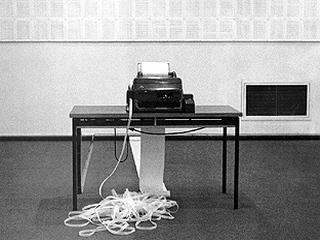157
News
Author: Hans Haacke
Year: 1969 Edit Add
Book: Postmodernism, or, The Cultural Logic of Late Capitalism
News
Author: Hans HaackeYear: 1969 Edit Add
Book: Postmodernism, or, The Cultural Logic of Late Capitalism
As for conceptual art and its evolution, however, it is worth adding that its later political variant - - in the work of Hans Haacke, for example -- redirects the deconstruction of perceptual categories specifically onto the framing institutions themselves. Here the paralogisms of the "work" include the museum, by drawing its space back into the material pretext and making a mental circuit through the artistic infrastructure unavoidable. Indeed, in Haacke it is not merely with museum space that we come to rest, but rather the museum itself, as an institution, opens up into its network of trustees, their affiliations with multinational corporations, and finally the global system of late capitalism proper, such that what used to be the limited and Kantian project of a restricted conceptual art expands into the very ambition of cognitive mapping itself (with all its specific representational contradictions). In Haacke, at any rate, the spatializing tendencies inherent from the beginning in conceptual art become overt and inescapable in the uneasy gestalt alternation between a "work of art" that abolishes itself to disclose the museum structure which contains it and one that expands its authority to include not merely that institutional structure but the institutional totality in which it is itself subsumed.
As for conceptual art and its evolution, however, it is worth adding that its later political variant - - in the work of Hans Haacke, for example -- redirects the deconstruction of perceptual categories specifically onto the framing institutions themselves. Here the paralogisms of the "work" include the museum, by drawing its space back into the material pretext and making a mental circuit through the artistic infrastructure unavoidable. Indeed, in Haacke it is not merely with museum space that we come to rest, but rather the museum itself, as an institution, opens up into its network of trustees, their affiliations with multinational corporations, and finally the global system of late capitalism proper, such that what used to be the limited and Kantian project of a restricted conceptual art expands into the very ambition of cognitive mapping itself (with all its specific representational contradictions). In Haacke, at any rate, the spatializing tendencies inherent from the beginning in conceptual art become overt and inescapable in the uneasy gestalt alternation between a "work of art" that abolishes itself to disclose the museum structure which contains it and one that expands its authority to include not merely that institutional structure but the institutional totality in which it is itself subsumed.
 Log-in
Log-in Source type: picture
Source type: picture